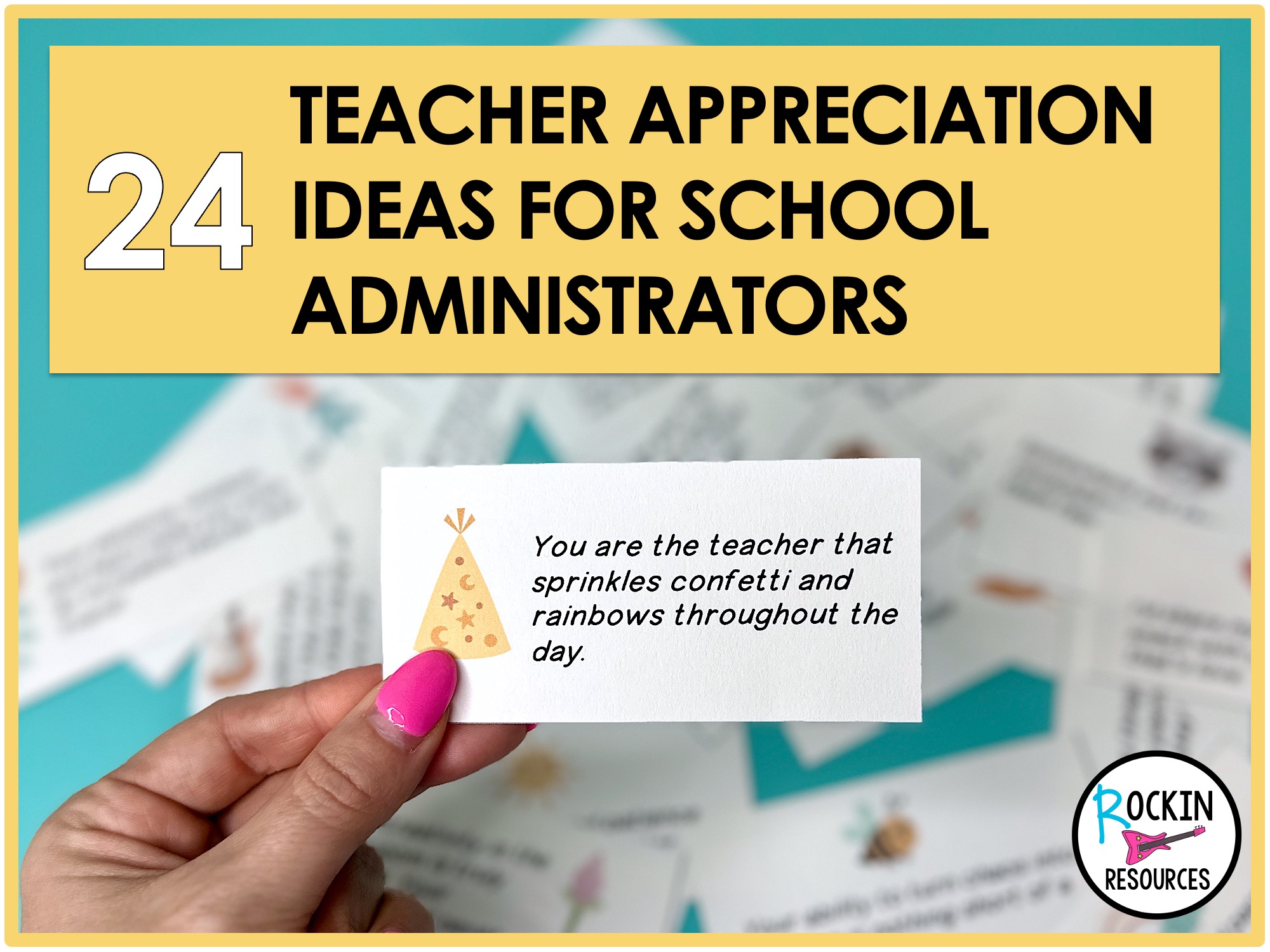Administrators, do you want your school rockin’? Take a moment to think about your school morale. Does it have a happy vibe? Kids make up the majority of your school, but how kids feel about being there depends on the climate and interaction of the people within the school. Teachers are the tone-setters who can make any class worth attending—or avoiding. If you want your school to be a joyous place, consider these tips for building school morale. When we take care of our teachers, our kids AND school will rock! Happy Teacher = Happy Student = Happy School. So principals, WHAT YOU NEED TO KNOW ABOUT SCHOOL MORALE will give you ideas! (Keep in mind that some of these suggestions might not be possible to enact during Covid.)
The Obvious:
Teachers are chronically underpaid in many districts. Sadly, some teachers who dedicate their lives not only to academically educating children and to teaching them life skills but also to serving as their advocates, have to work second jobs. They just don’t earn enough money in their primary career to be financially stable. You may not have the power to change teacher pay, but you do have the ability to boost teacher morale! Teachers are dedicated by nature and a little pat on the back goes a long way! A positive school environment, professional growth opportunities, personal freedoms, individual support, and overall respect are factors that lead to high teacher morale and keep them in the profession, even as the teacher shortage is growing and funds are tight. Learn some ways to boost your teacher morale!
Positive School Environment
No matter where the school is located or what it looks like on the outside, the environment within the school’s walls is what makes a difference. Walking into a school should be a welcoming experience where students, parents, and teachers feel instantly at home. Decorate the walls with inspirational murals, photographs, and children’s artwork. Use character trait words around the school or label hallways: Perseverance Place, Determined Drive, Compassionate Court, Responsible Road, etc.
What can we do for teachers? Make your school a second home for them. Not only do teachers spend the entire day at school, they also spend countless hours there before and after school. Take the time to decorate the staff lounge with lamps, fragrances, teacher inspirational quotes, and comfortable chairs. Provide free snacks and free packets of cocoa, tea, and coffee. Include some magazines and a “take one, give one” book nook so that teachers can take five minutes to read when they need a moment to escape. A television or radio in this space would be an added bonus! Even putting a little basket of toiletries and hygiene items in the teacher bathrooms would be a thoughtful gesture. Check with local businesses! Many times, they are willing to provide items for teachers! It won’t hurt to ask! We know teachers don’t have much time to spend in the staff lounge, so design a space where they can take a brain break and recharge. Getting back to the students with a good mindset is invaluable.
Sunshine Committee: Does your school have a Sunshine Committee? This committee comes up with ideas to boost school morale by placing positive notes in boxes, organizing fun activities and challenges, sending out cards, etc. In most schools, the committee is made up of teachers, but why not have some volunteers help out? Take some of the little things off teachers’ plates and let the volunteers spread rays of sunshine!
Professional Growth Opportunities
Let’s talk about the need for professional growth. We’re not talking about a classroom management seminar that everyone must attend, including those veteran teachers who have their management systems working like a well-oiled machine. New teachers might find such a seminar enriching, but veteran teachers may not. Although teachers can certainly learn new things from a seminar on a well-covered topic, keep in mind that professional growth is not a one-size-fits-all.
Teachers are individuals. Allowing them choice of opportunities provides a feeling of ownership and gives them a chance to spread their mental wings. Teachers see the benefits of offering choice in their classrooms. This concept is beneficial for teacher morale, too. If there is a workshop or seminar a teacher wants to attend, allow them to go without docking personal time. This will make them a better teacher and should be counted as a school-related activity. If the budget allows, reimburse teachers for the tuition or cost of the workshop, class, training, or professional development. If not, work towards fundraising or recalculating a budget so teachers can improve their craft without taking personal days or paying for their professional development out of pocket. Don’t forget, you can also find some valuable professional development that offers effective tips and strategies for teachers for free, too.
Teachers who develop their skills feel more confident as leaders and educators. People who indulge and develop their passions are more lively, bright, and enthusiastic. A building full of happy, enthusiastic, passionate people who are all sharing their knowledge will definitely boost school morale!
Support 1-2-3
Support for employees can come in many forms. Being there for moral support, providing resources, and offering extra hands in the classroom are just a few.
1. Moral support: Basically, be compassionate and understand your teachers’ needs and struggles. Know when their plates are full and when they need help. Whether they need your support with a difficult parent or student, a professional challenge, or even a personal issue, having your support can make a world of difference.
2. Resources: Giving teachers everything they need to make them successful in their jobs is not in most budgets, so teachers are known to spend their own money for their classrooms. Find ways to help. Ask teachers to share a list of resources they genuinely need to be successful in their classroom. You can have it be a “top three” or a few small items and one big item, etc. Use creative fundraising and budgeting to try to help each teacher get at least one item on their list. Find their favorite places to purchase resources. Many businesses, like Rockin’ Resources and TeachersPayTeachers offer sales throughout the year. Get on their newsletters for notifications of sales and bundles. Many places offer discounts for large orders. Be thrifty and surprise your teachers with a useful prezzy.
3. Extra hands: Another form of support is to find more hands to help in the classroom. If a teacher has a very large class, they most likely feel overwhelmed. There are more bodies, more minds, more individual needs, and more papers to grade. It is tough not to feel discouraged, especially if they see that other teachers in the school, district, or other districts in the state have smaller classes. No matter how much you may think that a teacher is a master of classroom management, a large class can still be exhausting. If hiring more teachers or assistants is out of the question, what about volunteers? There are dozens of parents, grandparents, and even concerned community members who are willing to get clearances and help local students. For lower grades or SPED students, you can have high school students come in too! Many high school teachers or programs look for ways to get their students involved and they become idols in the classroom. In one district in Texas, they have a HOPE (Helping Our Peers Excel). It is an elective course where they have to submit an application. Volunteers can support the teacher in the classroom by reviewing with students, leading a group or center, working one-on-one with IEP needs, being a mentor, making copies, putting together packets, filing papers, decorating the room or hall, and helping with many other tasks that will give your teacher some breathing room.
Communicate
Communication is key in all relationships. When couples or families don’t communicate, relationships get bumpy. One thing that teachers across the board often say is that they wish their principal would communicate more effectively and respect their time. What is one way to accomplish this? Open and honest communication. Share your vision for the school as a whole, for teaching teams, for classroom movement, for everything that will impact your teaching staff. Be clear and to the point so there are no gray areas that leave teachers questioning your expectations. Then establish a systematic chain of communication, such as weekly meetings with team leads who can then pass on information to teachers. Send out a daily “Hot List” over email of any news or notes in bullet point form, just to keep staff abreast of what’s going on. Acknowledge that more information can be requested or shared later, but keep your teachers informed.
Respect
Disrespect kills morale. It can beat down school morale in a single punch. A civil tongue and a kind word, even in the midst of tension, is a good guideline. Aside from polite and respectful dialogue with teachers, you can show teachers respect in the following ways.
Individuals: Respect individual teaching styles and preferences. Even if you love the way one teacher runs his room, teaches a subject, or establishes her routines—be respectful that other methods may work better for other teachers. Give them as much control and autonomy in their classroom as possible. Respect that they come to work to make a difference and give them the space to do so. That’s not to say you can’t point something out, give someone kudos, or offer advice. Just keep in mind that teachers have different personalities and have ideas of their own.
Needs: Respect needs. There are as many needs as there are teachers. For example, respect that a teacher with young children may call out more often with sick kiddos but will be a fixture at family fun nights and the school carnival, bringing her own kids along to enhance the community. Respect that your older teachers near retirement may never take a sick day but may need some quiet time at home and will make fewer after school appearances. One teacher may need administrative support as they find their feet as a new professional. Another may need you to give them space as they run their room with their eyes closed. Respecting individual needs for space, time, and support will garner great boosts in morale for everyone.
Time: Teachers are constantly receiving new demands and are subject to time constraints that naturally occur in the school year. One of the biggest complaints teachers have is feeling overwhelmed and running out of time to cover their material or to get things done. Respect teachers’ time as much as possible. There are several ways that you can do this.
1. Be Mindful of Prep Periods. Planning periods might be an easy target if you need to have a meeting. Instead, arrange coverage for the class during the end of a period to convene a quick meeting or else, communicate through email or video.
2. Limit Post- and Pre-School Demands: Staff meetings are often held before or after the school day. Sometimes meetings are held for the whole staff to address an issue with one grade or even an issue experienced by just one teacher. Truncate whole staff meetings. Other times administrators take up too much of the teacher’s time on things that could have been said in an email. You’ve seen those memes out there! Save the important things for staff meetings. Keep them short and focus on necessary general information that all must know. Schedule meetings with specific teachers and teams as needed so that others will not lose valuable time. If there is an issue for one staff member, address just that person. If possible, send memos and written communication that can be read at leisure.
3. Eliminate or Limit Extra Duties: Teachers across the country take morning and afternoon bus and auditorium duty, recess duty, lunchroom duty, etc. It’s all part of being a teacher. It’s also part of losing valuable time to plan and prepare. Preparation time helps frustration stay low and morale stay high. Some schools have the budgets to hire support staff, “lunch ladies”, and bus monitors, etc. That’s wonderful, but if yours doesn’t, don’t forget to ask for volunteers with clearances to step in. Barring that, try to make sure coverages are as few as possible and spread out evenly. Even a few volunteer spots in the rotation would give teachers an occasional block of prep time. Every gift of time is a bonus to a teacher, and we all know that bonuses boost morale!
Creativity
Government agencies and businesses have taken over lower-performing schools, often with mixed results. One thing a majority of these schools have in common is the rigid structure and implementation of the curriculum. Sometimes teachers are subjected to strict timetables and censured if they’re even a minute behind. That sort of pressure lowers morale. The inability to stop and help a struggling student for an extra five minutes leads to resentment and feelings of helplessness. Lastly, lack of freedom and creative control in one’s own classroom takes the joy out of teaching. Some traditional schools, bowing to the pressure of “teaching to the test,” are placing teachers under these same constraints. If individuals wanted a job comprised of strict routine without room for originality and creative ways to share knowledge, they likely wouldn’t be in this profession.
Boost morale by encouraging teachers to use standards and curriculums as a guideline and foundation—not the end-all, be-all. If standards are being met, let teachers meet them in whatever ways suit them and their diverse students. Just as teachers need to be seen as individuals, so do students! Teachers are the ones who can best determine how to meet the needs of their students. By giving them free rein and explaining that you support their teaching methods, style, and decisions, you show your respect for them as professionals and you validate them as educators. What an incredible, empowering feeling that is, in any profession!
When you’re having a bad day, you’re stressed, and you’re ready to go hide in your bed with the covers over your head, a good friend can always make it better. In the comprehensive article, “Understanding Teacher Morale”, Virginia Commonwealth University’s Jesse Senechal, Tamara Sober, and Samantha Hope interviewed many teachers in various settings to better understand what helps morale to remain high. While workload and stress may influence morale from day-to-day, what ultimately keeps morale high is positive relationships with students.
It’s great to have a strong rapport with your teaching team, whether it be grade-level or subject-area. You might see your co-workers for an hour a day. You might see your students for five or six. To raise morale in your school, help your teachers have great relationships with their students.
Encourage teachers and students to have fun within and outside of the classroom with extracurricular school-sponsored activities like staff vs. student sports games, board game nights, ice cream socials, movie nights, etc. If your teacher would like to have classroom parties or special traditions in their classroom that take occasional time away from the curriculum—make the investment. Let the teachers determine what works best and support them as they implement these ideas. A great bond between student and teacher benefits both adults and children. In fact, it benefits the entire school.
Over the years we’ve worked for or heard about amazing principals and unfortunately not-so-amazing ones. Instead of taking time to focus on negative vibes that some administrators may give, let’s focus on the ones that make TEACHERS’ LIVES BETTER! From the many teachers surveyed, it wasn’t a surprise to hear that teachers worked harder for administrators that showed them respect and took the time to find ways to boost teacher morale.
SEE SIMILAR BLOG POSTS:
DISCOVER RELATED RESOURCES:
SHARE THIS POST ON PINTEREST:











